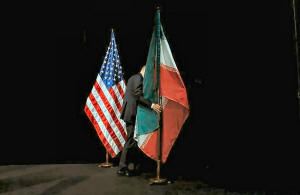|
As Trump leaves Iran deal, families of
Americans jailed in Iran urge talks
 Send a link to a friend
Send a link to a friend
 [May 10, 2018]
By Jonathan Landay, Joseph Ax and Bozorgmehr Sharafedin [May 10, 2018]
By Jonathan Landay, Joseph Ax and Bozorgmehr Sharafedin
WASHINGTON/NEW YORK/LONDON (Reuters) - A
day after U.S. President Donald Trump pulled out of the Iran nuclear
deal, several families of American prisoners held in the Islamic
Republic urged the White House to start humanitarian talks with Tehran
to win their release.
The families made the appeal as U.S. Secretary of State Mike Pompeo was
returning home on Wednesday with three Americans freed from imprisonment
by North Korea, with whom Washington is hoping to pursue
denuclearization talks.
Already tense relations between Washington and Tehran hit a new low with
Trump extracting the United States from the 2015 international nuclear
accord, making it unlikely either country would be in a mood to engage
in any talks soon.
The White House did not immediately respond when asked by Reuters if the
administration was open to holding talks with Iran on the prisoners.
The Trump administration has repeatedly demanded their release.
Two are dual Iranian-U.S. nationals 81-year-old Baquer Namazi and one of
his sons, Siamak Namazi, 46, who were sentenced to 10 years in prison in
October 2016 on charges of spying and collaborating with the United
States.

"The situation of my family obviously has to remain as a separate
humanitarian issue and it should be disconnected from all the
difficulties that the two countries are facing," said Babak Namazi of
his father and brother after delivering that message to two senior
administration officials at a White House meeting.
Babak and Jared Genser, a Namazi family attorney, said they urged the
officials to open a private dialogue with Iran.
Given the release of the Americans by North Korea, Genser added, "our
view is that it should be a lot easier ... to get American hostages out
of Iran as compared to American hostages out of North Korea."
Wendy Sherman, who led the U.S. negotiating team in talks that
culminated in the nuclear accord during the Obama administration,
expressed concern that Trump's "reckless action" likely means "that it
will be even longer before Americans detained and missing in Iran come
home."
At least seven American citizens or permanent residents have been
arrested in Iran since 2016, their lawyers or relatives have told media,
of whom one has been freed on bail.
Iranian authorities previously have denied holding detainees for ransom
and accuse Western governments of holding Iranians on trumped-up
charges.
Kazem Gharibabadi, deputy head of Iranís Council for Human Rights, part
of the judiciary, has said more than 56 Iranians are imprisoned in the
United States and an unspecified number in other countries.

Hua Qu said her imprisoned husband, U.S. citizen Xiyue Wang, had become
a "political pawn and a victim of this deteriorating relationship."
[to top of second column]
|

A staff member removes the Iranian flag from the stage after a group
picture with foreign ministers and representatives of the U.S.,
Iran, China, Russia, Britain, Germany, France and the European Union
during the Iran nuclear talks at the Vienna International Center in
Vienna, Austria July 14, 2015. REUTERS/Carlos Barria/File Photo

His case, she said, will hopefully receive more attention from U.S.
officials, who previously raised it with their Iranian counterparts at
quarterly meetings on the nuclear deal with little progress to show for
it.
"To raise it once and wait for three months is too slow," said Hua,
speaking by telephone from her home in Princeton, New Jersey. Echoing
Namazi and Genser, she said the administration should pursue a dialogue
with Iran solely focused on prisoners.
"This is a humanitarian issue, and there should be a humanitarian
solution. I don't think putting this into a complicated political
situation is the solution," she said.
Xiyue Wang is a Princeton University graduate student who was sentenced
to 10 years in prison on spying charges by an Iranian court in July
2017.
A married couple, Karan Vafadari, a U.S. citizen, and Afarin Neyssari, a
U.S. permanent resident, were sentenced to 27 years and 16 years of
imprisonment respectively, on charges which included espionage,
according to the family.
"My brother is still in prison. He was/is never been political. I just
hope they donít use him as a political tool while the too countries are
in bad terms," Vafadari's Washington-based sister Kateh told Reuters.

As of November 2017, Iranís Revolutionary Guards had arrested at least
30 dual nationals during the past two years, mostly on spying charges,
according to lawyers, diplomats and relatives.
The dual nationals include Nazanin Zaghari-Ratcliffe, a project manager
with the Thomson Reuters Foundation, who was arrested in April 2016.
Zaghari-Ratcliffe, a British-Iranian, was convicted of plotting to
overthrow Iranís clerical establishment, a charge strongly denied by her
family and the Foundation, a charity organization that is independent of
Thomson Reuters and operates independently of Reuters News.
(Reporting by Jonathan Landay, Joseph Ax and Bozorgmehr Sharafedin;
additional reporting by Lesley Wroughton in Washington; Editing by Yara
Bayoumy and Grant McCool)
[© 2018 Thomson Reuters. All rights
reserved.]
Copyright 2018 Reuters. All rights reserved. This material may not be published,
broadcast, rewritten or redistributed.
Thompson Reuters is solely responsible for this content. |